Black Individuals reside in several types of communities throughout the nation. For about half of Black adults (52%), the situation the place they at present reside is essential to how they consider themselves. However general, their rankings of the locations the place they reside are blended. Throughout communities, the identical considerations are cited as a very powerful to handle – violence or crime and financial points corresponding to poverty and homelessness. When requested who’s answerable for addressing these points, practically half of Black adults (48%) say native leaders ought to tackle them.
For a lot of Black adults, the place they reside shapes how they consider themselves
About half (52%) of Black adults say the situation the place they at present reside is extraordinarily or essential to how they consider themselves. Roughly three-in-ten (29%) say the place they at present reside is considerably essential to their private identification. And about one-in-five Black adults say the place they reside is somewhat or in no way essential (19%) to how they consider themselves.
There are variations on this problem throughout some demographic subgroups. Roughly half of non-Hispanic Black adults (52%) say the place they at present reside is extraordinarily or essential to how they consider themselves – making them extra more likely to say so than multiracial Black adults (38%). Black immigrants and U.S.-born Black adults are about equally more likely to say the place the place they at present reside is extraordinarily or essential to how they see their private identification (55% and 51%, respectively).
Amongst Black adults who say being Black is extraordinarily or essential to their identification, 57% say the place the place they reside is extraordinarily or essential to how they consider themselves. That is considerably larger than amongst those that say being Black is much less essential to them (33%).
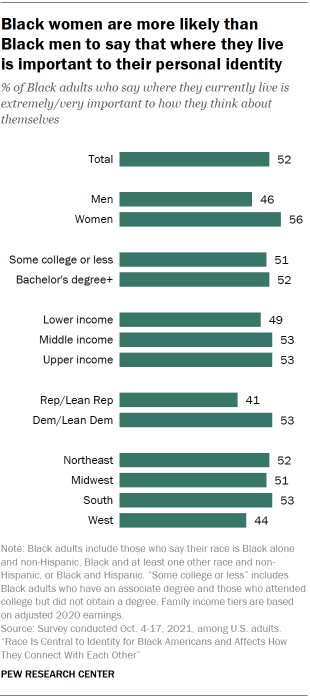
There are different demographic variations, too. Black girls are extra doubtless than Black males to say the place they at present reside is extraordinarily or essential to how they consider themselves (56% vs. 46%). With regards to age, adults 50 and older are extra doubtless than these beneath 50 to say that the place they at present reside is extraordinarily or essential to their identification (61% vs. 44%). As well as, Black Democrats and Democratic leaners (53%) are extra doubtless than Black Republicans and Republican leaners (41%) to say the place the place they reside is extraordinarily or essential to their private identification.
Most people’s responses differ from the Black inhabitants on this measure. Whereas about half (52%) of the Black grownup inhabitants say that the situation the place they at present reside is extraordinarily or essential to how they consider themselves, 45% of all U.S. adults share the identical view. And among the many public general, 31% say that the place they at present reside is considerably essential to how they consider themselves, whereas 23% say it is a little or in no way essential.
Black adults usually tend to reside in city and suburban areas
The U.S. Black inhabitants is dispersed throughout the nation, although over half lives within the nation’s Southern area. And inside every area of the US, the Black inhabitants is unfold throughout varied kinds of communities.
Roughly equal shares of Black adults describe the group the place they reside as city (41%) or suburban (40%), whereas virtually two-in-ten (18%) describe their group as rural, in line with the brand new Pew Analysis Heart survey.
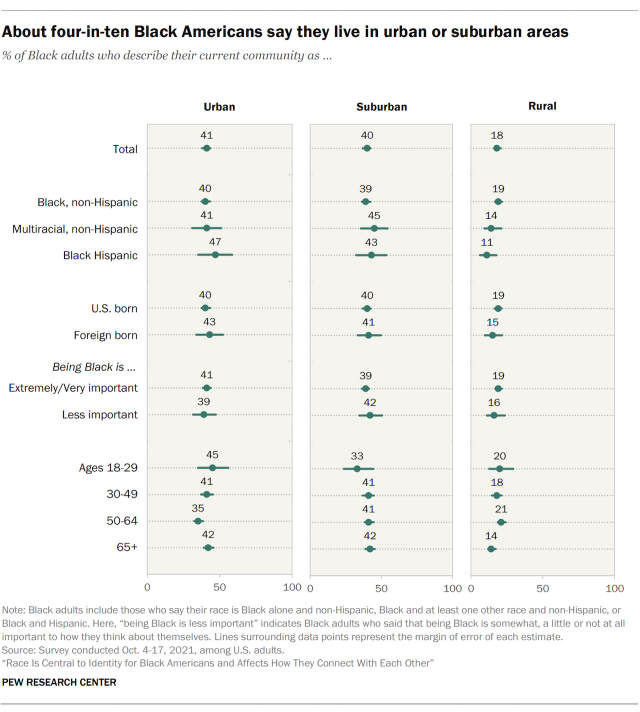
Although related shares of the Black inhabitants say they reside in suburban and concrete areas, there are variations in group kind amongst demographic teams. Non-Hispanic Black adults are related of their distribution to the Black grownup inhabitants general: They’re about as more likely to say they reside in suburban (39%) and concrete areas (40%), whereas 19% say they reside in rural areas.
However the distribution of group kind is completely different for multiracial Black adults – 45% say they reside in suburban communities, whereas 41% say they reside in city areas and 18% say they reside in rural areas. And amongst Black Hispanics, 52% say they’re in suburban locations, 40% say they’re in city areas and 14% say they reside in rural areas.
A barely larger share of U.S.-born Black adults say they reside in rural areas (19%) than the share of immigrant Black adults (15%) who say the identical. Each teams are about as more likely to be in city and suburban areas.
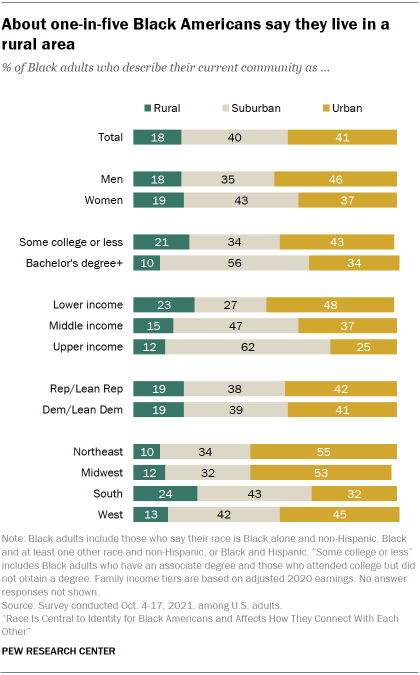
Amongst Black adults, males are extra doubtless than girls to explain the group they reside in as city (46% vs. 37%, respectively), whereas girls (43%) are extra doubtless than males (35%) to reside in a suburban group.
There are variations by area as properly. Black adults within the South are extra doubtless than these within the Northeast, Midwest and West to reside in a group they describe as rural. Accordingly, Black folks within the Northeast, Midwest and West are extra doubtless than these within the South to reside in communities they describe as city.
Round four-in-ten Republican or Republican-leaning and Democratic or Democratic-leaning Black adults (38% and 39%, respectively) describe the group the place they reside as city. The same sample emerges amongst Democrats (39%) and Republicans (38%) who describe their group as suburban. Equal shares of Black Democrats and Republicans describe their group as rural (19% every).
There are vital variations in self-described group kind by schooling throughout the Black inhabitants. Adults with a university diploma or larger usually tend to reside in communities they describe as suburban. Over half (56%) of Black adults with a university diploma or larger say they reside in a suburban group, whereas 34% of those that attended some school or much less say the identical.
There are related variations by earnings degree as properly. Black adults with decrease incomes usually tend to reside in a self-described city space than these in with higher incomes (48% vs. 25%). They’re additionally extra more likely to reside in rural communities than these with higher incomes (23% vs. 12%). Black adults with decrease incomes are much less doubtless than their these with higher incomes to explain their group as suburban (27% vs. 62%, respectively).
The Black inhabitants’s self-described group kind differs from that of most people. Half of U.S. adults general describe their present group as suburban, whereas roughly 1 / 4 every of that inhabitants describe their present communities as city (23%) or rural (27%).
About four-in-ten Black Individuals (41%) price their group as a wonderful or superb place to reside, in line with the brand new survey. About one-third (34%) price their group as a very good place to reside, whereas a couple of quarter (24%) price their group as honest or poor. Inside the Black inhabitants, group rankings differ by demographic traits.
Black Hispanic adults (54%) are considerably extra doubtless than non-Hispanic Black adults (40%) to price their group as wonderful or superb. Some 47% of multiracial Black adults say the identical about their group. And whereas roughly half (52%) of immigrant Black adults say their group is a superb or superb place to reside, four-in-ten U.S.-born Black adults say the identical.
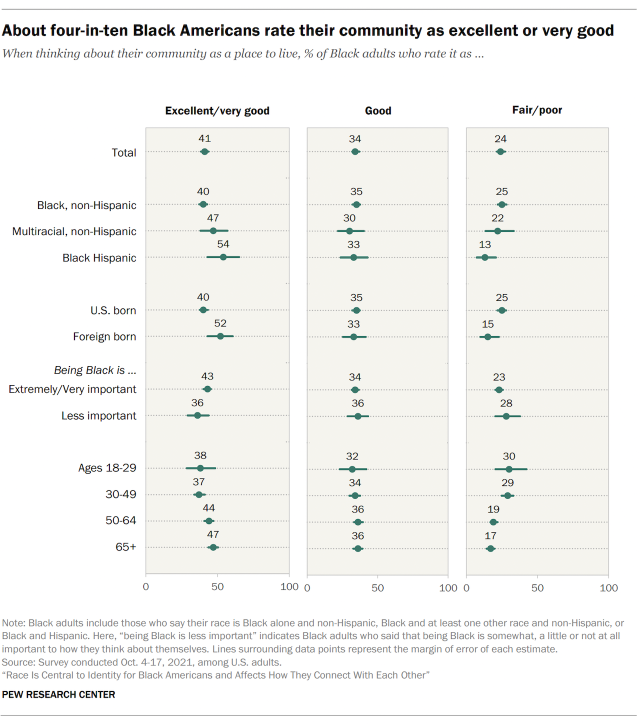
Comparable shares of Black girls, Black males, Black Democrats and Black Republicans price their communities positively – about four-in-ten for every group price the communities the place they reside as wonderful or superb.
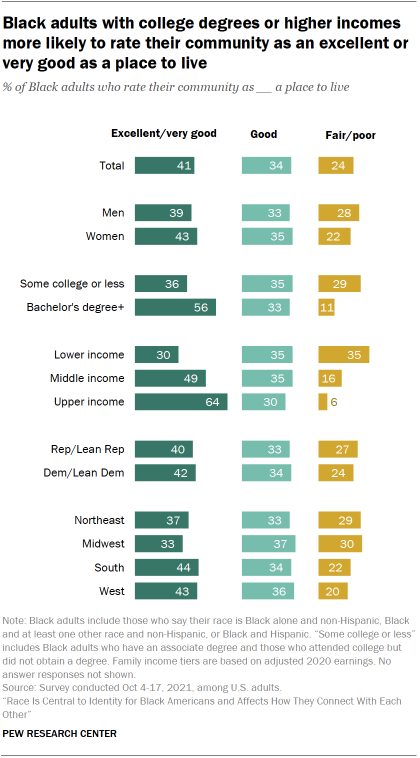
Neighborhood rankings additionally differ by schooling and earnings. Black adults with a university diploma or larger are considerably extra doubtless than Black adults with no school diploma to price their group as a wonderful or superb place to reside, (56% vs. 36%, respectively).
Black adults with larger incomes are 34 factors extra doubtless than those that earn decrease incomes to say their group is a superb or superb place to reside (64% vs. 30%), whereas about half (49%) of those that are center earnings share the identical opinion.
Black adults who reside in self-described city areas are considerably extra doubtless than their suburban and rural counterparts to price the group the place they reside as honest or poor (35% vs. 11% and 27%, respectively). Roughly half (53%) of these in suburban communities price their group as a wonderful or superb place to reside – considerably larger than the 29% who say the identical in city communities and the 42% in rural communities.
Typically, Black adults price their communities much less positively than all U.S. adults. Whereas roughly four-in-ten Black adults (41%) price their group as wonderful or superb, 58% of all U.S. adults say the identical. Roughly three-in-ten U.S. adults (29%) price their group nearly as good, whereas 13% say their group is honest or poor.
Violence, the financial system and housing prime the listing of essential group points for Black Individuals
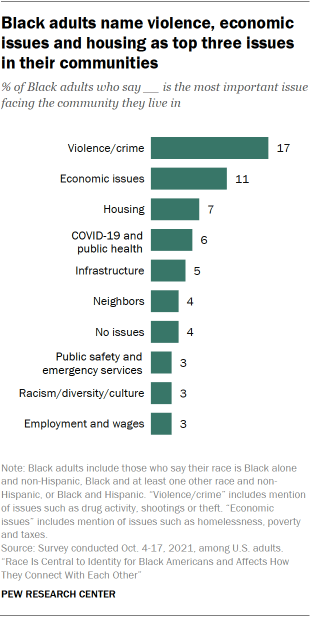
When requested in an open-ended query to establish a very powerful problem in the neighborhood they reside in, the highest problem was violence or crime (17%). This consists of Black Individuals who listed particular points corresponding to drug exercise, shootings, or theft; but in addition those that merely listed “violence” or “crime” as probably the most urgent points of their communities. One other 11% of Black adults mentioned financial points such homelessness, poverty and taxes had been most essential.
Different prime points embody housing (7%), COVID-19 and public well being (6%), infrastructure (5%), neighbors (4%), the provision of public security and emergency providers (3%), variations amongst neighbors attributable to racism, variety or tradition (3%), and employment and wages (3%). Some 4% didn’t identify a difficulty.
A very powerful native problem named throughout demographic subgroups of Black Individuals does differ. However notably, the identical points are sometimes among the many prime three native points talked about for many teams – violence and crime, financial points, and housing points – even when their rankings is probably not the identical.
Violence or crime is the highest problem for each non-Hispanic and Hispanic Black adults, however second for individuals who establish as multiracial. In the meantime, multiracial Black adults point out an economy-related concern as the highest problem of their group, whereas this ranks second amongst non-Hispanic and Hispanic Black adults. Housing was the third-most essential group problem named by non-Hispanic and multiracial Black adults, however fifth among the many Hispanic Black inhabitants.
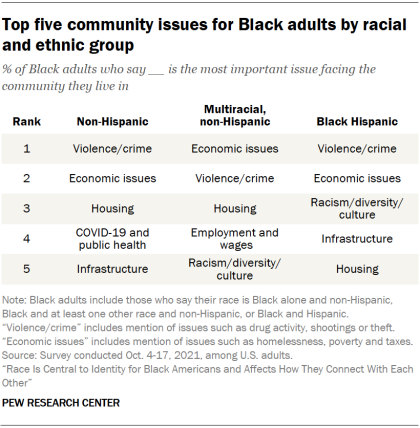
Each U.S.-born and immigrant Black adults identify violence or crime as a very powerful problem dealing with their group (17% and 15%, respectively), however the rating of points doesn’t considerably differ between these two teams. Apart from violence or crime, the opposite prime points among the many U.S.-born Black inhabitants are financial points (10%) and housing (7%). For the Black foreign-born inhabitants, the second-most talked about problem is financial points (11%), whereas COVID-19 and public well being (7%) is the third-most talked about problem.
Violence or crime is probably the most talked about problem amongst each those that say being Black is extraordinarily or essential to how they consider themselves (18%) and people who say being Black shouldn’t be as essential to how they consider themselves (13%). Financial points are the second-most talked about group problem for individuals who say being Black could be very or extraordinarily essential to them (11%), however amongst these for whom being Black is much less essential, housing is the second-most talked about problem (11%) and financial points rank third (9%).
Views about a very powerful problem of their group varies by age amongst Black adults. Financial points are probably the most talked about amongst Black 18- to 29-year-old adults (15%), with violence or crime (12%) coming in second. Nonetheless, these ages 18 to 29 (12%) are extra doubtless than these ages 30 to 49 (5%) or 50 to 64 (6%) to say housing is a very powerful problem dealing with their group. The highest problem for Black adults between the ages of 30 to 49, 50 to 64 and 65 and older is violence or crime (20%, 18% and 16%, respectively).
Black adults differ solely barely on this query by schooling and earnings. The highest problem named by Black adults with and with no bachelor’s diploma is violence or crime (14% and 18% in every respective group identify this), whereas the problem talked about second-most usually by each teams is financial points (12% and 10%, respectively). Black adults with a university diploma or larger are much less doubtless (14%) than these with decrease instructional attainment (18%) to say violence or crime is a very powerful problem of their group. In the meantime, the highest group problem talked about amongst Black adults with decrease or center incomes is violence or crime (20% amongst decrease earnings, 16% amongst center earnings). COVID-19 and public well being, violence or crime, and financial points are tied as the problems talked about most by Black adults with higher incomes (11% every).
There are variations by area as properly. The highest problem named by Black adults dwelling within the Midwest, Northeast and South is violence or crime (24%, 20% and 15%, respectively), whereas financial points and housing are the highest two considerations cited by these within the West (20% and 18%, respectively). Black folks within the South are additionally extra doubtless than these within the different three areas to report infrastructure as a very powerful problem of their group.
The Black inhabitants’s score of a very powerful problem dealing with the group they reside in is simply barely completely different from that of most people. Individuals general identify financial points (15%), violence or crime (12%), and COVID-19 and public well being (7%) as a very powerful points of their group.
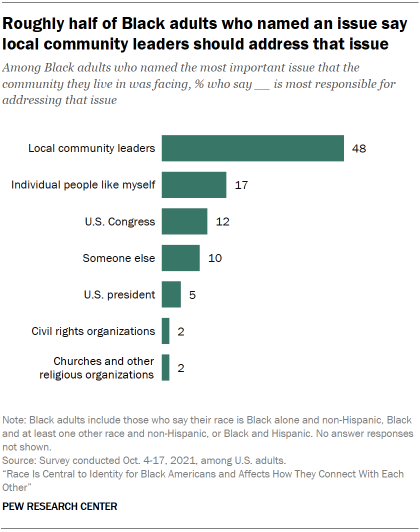
When requested who’s most answerable for addressing their group’s most essential problem, virtually half of Black adults who identify such a difficulty say area people leaders (48%) are most answerable for addressing that problem. Smaller shares say particular person folks like themselves (17%), the U.S. Congress (12%), another person (10%) or the U.S. president (5%) are answerable for fixing urgent native points.
Half of non-Hispanic Black adults (49%) level to area people leaders as probably the most answerable for fixing a very powerful problem dealing with their group, with multiracial and Black Hispanic adults being about as more likely to say the identical. And roughly half (49%) of U.S.-born Black adults and four-in-ten Black immigrants who named an area problem say native leaders ought to be most answerable for addressing a very powerful problem of their group.
Solutions didn’t differ a lot, if in any respect, based mostly on how essential Blackness was to every respondent. Of the adults who named an area problem, those that say being Black is extraordinarily or essential to how they consider themselves are about as doubtless as those that say being Black is much less essential to how they consider themselves to say area people leaders are most answerable for addressing a very powerful problem in the neighborhood they reside in (50% and 44%, respectively).
Whereas four-in-ten or extra of each Black Republicans and Republican leaners (40%) and Black Democrats and Democratic leaners (50%) say area people leaders ought to be most accountable, there are variations by celebration in the case of naming civil rights organizations. Black Republicans are considerably extra doubtless than Black Democrats to say civil rights organizations are most answerable for addressing a very powerful problem of their group (8% vs. 1%).
Considerably related shares of Black adults in self-described city, suburban and rural communities identify area people leaders as most accountable (46%, 50% and 52%, respectively). Black adults in rural communities are much less doubtless than these in city communities to call Congress as most answerable for addressing a very powerful problem of their group (8% vs. 14%).
Black adults within the South are extra doubtless than these within the Midwest and West to say that area people leaders are most answerable for addressing this group problem (53% vs. 42% and 40%, respectively). Round half (49%) within the Northeast level to group leaders as most accountable as properly. Black adults within the West and Northeast (23% and 16%, respectively) are extra doubtless than these within the Midwest (8%) and South (9%) to say Congress is most answerable for addressing a very powerful problem of their group.
Solutions to this query differ by schooling and earnings among the many Black inhabitants. Black adults with a bachelor’s diploma or larger are extra doubtless than these with no diploma to say area people leaders are most accountable (54% vs. 46%). About half or extra of Black adults in middle- and upper-income tiers say area people leaders ought to be most answerable for addressing this problem (52% and 56%, respectively), considerably greater than these within the lower-income tier (44%).
Black Individuals who named violence or crime, financial points, or housing as a very powerful problem of their neighborhoods are nonetheless most certainly to say that native leaders ought to be answerable for addressing these points. Nonetheless, amongst those that identify financial points as most essential, virtually three-in-ten (29%) say Congress is most accountable. And amongst those that identify housing as a very powerful problem of their neighborhoods, roughly one-in-five say Congress (21%) ought to be accountable.
Most people and Black inhabitants’s responses to this query are considerably related. Half of U.S. adults general say that area people leaders ought to be most answerable for addressing a very powerful problem of their group, whereas 16% level to particular person folks, 13% level to Congress and 10% level to another person as most accountable.






























































